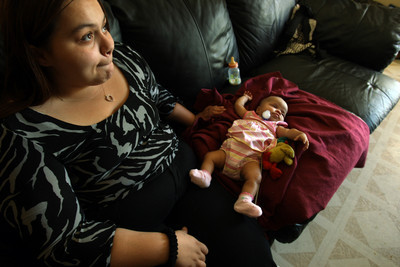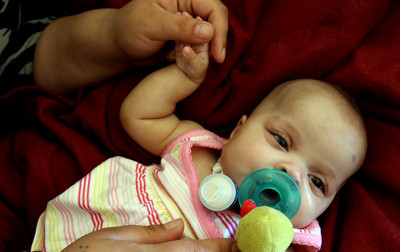Medicaid patients left without care
At-home nursing care for Clark County's poor and medically fragile children is structured like a house of cards. Withdraw a key component, such as the primary home-care provider contracted to accept Medicaid patients, and what remains threatens to collapse.
Clark County and state officials are moving to prevent that from happening on March 30, when Colonial Home Care, now part of Maxim Healthcare Services, stops accepting Medicaid. The decision was brought about because Nevada's Medicaid rate of compensation falls short of covering the actual cost of care to Colonial.
Colonial's decision discontinues services for at least 117 patients. Among that number are 11 Medicaid-dependent children who have open cases with Clark County Family Services.
Some are bed-bound. Some rely on wheelchairs. Some, like 5-month-old Ti'ana Simmons, have multiple medical conditions that require 24-hour care. Ti'ana has undergone surgery five times since her birth, the last one to correct a congenital heart defect. She also has two chromosomal abnormalities and was born with deformed feet.
Ti'ana's mother, 21-year-old Krystal Rios, most recently brought her daughter home from Sunrise Medical Center on March 4.
Although Rios has been approved for 24 hours of nursing services a week under Medicaid, she hasn't found anyone to permanently replace the visiting Colonial nurse who worked with Ti'ana in the past.
"It's a worry," said Rios, who has learned how to monitor and care for Ti'ana's feeding tube and tracheotomy tube herself.
Rios, who has four other children, is getting assistance from Family Services to meet the needs of her infirm daughter. She refuses to think about losing Ti'ana to the system, just because an at-home nursing provider that accepts Medicaid can't be found.
"I'm destined to care for my daughter," Rios said. "She's better at home under my care than she is with anyone else."
Colonial's decision to stop services for Medicaid patients was difficult to make and arrived at reluctantly, said General Manager Darris Clark, who also is a registered nurse.
Since 2000, Colonial has operated without any increase in the state Medicaid rate. In 2007, the widening gap between the actual cost of nursing care and the rate of compensation from Medicaid forced the home-care agency into the red.
Negotiations to increase the rate set by the state have been unsuccessful. In addition, talks between Colonial and Nevada officials indicate that no increase in the Medicaid rate is likely to be approved by legislators in the next session because of state revenue shortfalls.
Clark said that with no relief in sight, Colonial was left with two options: Continue to care for Medicaid patients and go out of business; or stop accepting Medicaid and continue care for the 450 Colonial patients with other insurance plans.
"In all reality, we should have stopped accepting Medicaid four years ago," Clark said. "We've been a Band-Aid on this for so long, we became the problem."
Charles Duarte, administrator for the Nevada Division of Health Care Financing and Policy, said there is no easy solution in the short-term. Nevada's Medicaid program is being buffeted by Gov. Jim Gibbons' call to reduce general fund spending by 4.5 percent, which amounts to about $42 million for Duarte's division. On top of that, the state Medicaid program is facing an additional loss of $20 million in federal matching funds.
"Add it all together and we're facing a significant shortfall," Duarte said.
Duarte said he received a request for a rate increase from Maxim, Colonial's parent company. The request was evaluated, but covering it would require robbing Peter to pay Paul, Duarte said. The dollars to do it just aren't available.
Duarte also has received anxious queries from those who rely on Colonial for care. He has emphasized to the company and its affected patients that Colonial has a legal obligation to develop safe and appropriate care plans for transition to other services.
"I must add that Colonial's strategy of 'making a point' to Medicaid by disrupting the care of these recipients does not seem very ethical," Duarte wrote in a communication to one concerned patient. "We have never backed away from working with Colonial on any of their payment issues. We have listened to the concerns of these agencies to implement new, more seamless billing practices. It is very disappointing that they have chosen to make this decision."
Clark bristled at the implication that Colonial is acting unethically. Letters of notification were sent to patients at the end of February, giving them 30 days notice of the change instead of the required 72-hour notice of discharge, Clark said.
A list of alternate at-home nursing providers was included with the letter, but Rios said no one she contacted on the list accepted Medicaid.
Clark said the information was taken from the state's own Web site. And if none accepts Medicaid, perhaps it's time to look at why, Clark said.
"They can't legislate us out of business. We are not UMC's emergency room. We can't continue to operate at a loss."
The financial divide between what Medicaid pays and what care costs also has caused problems with staff turnover, Clark said. Colonial loses staff to other agencies who can pay higher salaries. And if Colonial can't maintain staff, there is no at-home nursing, he said.
Colonial's withdrawal from Medicaid may force a de facto rate increase for at-home nursing on Clark County Family Services. Faced with the loss of a Medicaid provider, family services has formed a temporary solution until a new Medicaid provider is identified by the state.
Family Services spokeswoman Christine Skorupski said the department is looking at combining federal and county grant funds to pay a higher rate to Positively Kids, another provider of at-home nursing. The Medicaid reimbursement rate per hour for a registered nurse is about $36.73; a licensed practical nurse receives about $27.28. The grant funds will allow the county to pay Positively Kids $50 per hour for registered nurses and $33 per hour for licensed practical nurses.
For the 11 medically fragile children with open child welfare cases, the cost of care will be about $12,000 a week, Skorupski said. It's an expense Family Services will only be able to support for about four months.
"What is alarming to us is how many kids may come into care because the parents don't have any nursing alternatives," Skorupski said.
Charles Perry, executive director of the Nevada Health Care Association, said what's happening appears to be a classic Catch-22.
His group, which represents long-term care facilities in Nevada, has lobbied repeatedly and unsuccessfully for increases to the state Medicaid budget.
"Medicaid and Medicare have never been high priority issues for people in the state of Nevada," said Perry, himself a former legislator. "There's a whole lot more attention paid to folks in prison than to people in nursing homes."
Duarte said the state is seeking a replacement for Colonial. The state also is still in talks with Colonial to see if some kind of resolution can be reached.
"We're not going to let these kids get harmed," Duarte said.
Contact reporter Lisa Kim Bach at lbach @reviewjournal.com or (702) 383-0287.


















